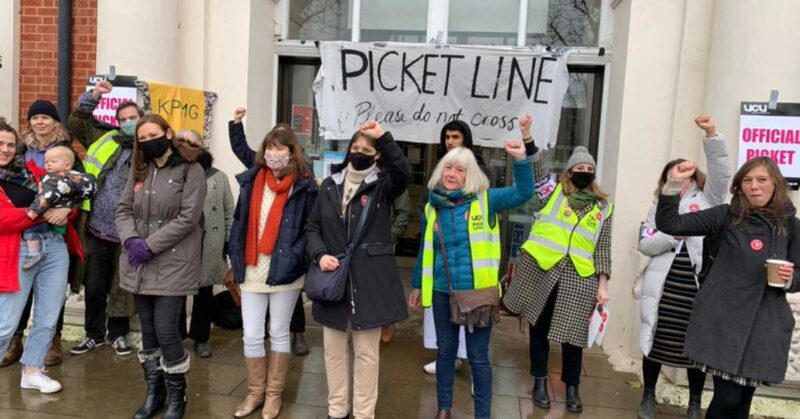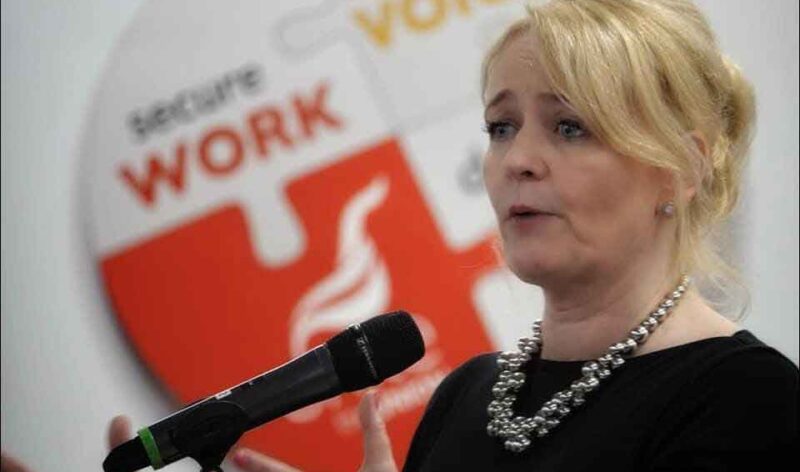Fighting for the right to strike
 Jeremy Dewar recounts how the anti-union laws shackled the unions and calls for defiance
Jeremy Dewar recounts how the anti-union laws shackled the unions and calls for defiance
There is no legal right to strike in Britain. This simple statement can come as a surprise to many British trade unionists. To European workers, it is a bizarre idea.
But it is true nonetheless. Even if a valid trades dispute is registered, membership databases are accurate, full notice is given, a majority vote for a strike, further notice is sent to the employer and there are only six pickets… strikers can still be locked out, that is, sacked en masse.
Perhaps it is no coincidence that in the country that gave birth to trade unions, there is also the longest opposition to their rights. Britain’s bosses were early learners when it comes to fear and loathing for the unions.
Striking in the UK constitutes a breach of contract for which you can be dismissed; when you fail to turn up for work, you can be sacked. But if you are in a trade dispute with your employer, then certain “immunities” from prosecution for damages have been granted by parliament – though for over a century and a half judges, using the common law have chipped away and reversed them.
From the late 1960s Acts of Parliament have sought to narrow these immunities.
Thatcher’s anti-union laws
The most famous of these restrictions date from 1980 to 1993: the Tory anti-union laws. As Tony Blair boasted during the 1997 election campaign, these laws are “the most restrictive on trade unions in the Western world”. So what are they?
First Margaret Thatcher ruled that the trade dispute could only be with one’s “own” employer and that there could only be six pickets outside their own workplace. “Secondary picketing” was outlawed; workers could not call for solidarity in firms for which they supplied goods.
The Gate Gourmet strike showed what this means. Catering workers were sacked in 2005 because British Airways, the sole customer for their in-flight meals, demanded Gate Gourmet reduce costs. But when they went on strike, the women were not permitted to picket BA. And when BA workers struck in solidarity, their stewards were sacked. The bosses held all the cards.
The law allowed the police to arrest pickets and the courts to place restrictions on their movements. In the miners’ strike, this led to flying pickets being stopped on motorways and told to turn round. News International printers were not allowed to picket anywhere because their Fleet Street workplace was closed down when Rupert Murdoch started printing The Sun and The Times with a new, scab workforce in Wapping.
In 1984 secret ballots became mandatory. Later postal ballots were required; the employers were shown the wording on the ballot; members’ names, addresses, job titles and workplaces were also handed over. The employer was entitled to seven days notice of a ballot and a further seven days notice after the vote, before any action could take place. This took about a month.
It had an enormous effect on workers’ ability to resist management diktat. In the 1960s and ‘70s, rank and file militants mounted lightning strikes, which paralysed production, often when it cost the bosses most – when the concrete had just been poured on a building site, for example. Grievances were discussed at the moment they occurred and in the workplace, where collectivity and solidarity bore heavily on workers’ minds.
By stretching out the process and balloting in the isolation of workers’ homes, the bosses gained the upper hand. The TV slandered the unions’ case. Management sent out letters threatening instant dismissal to those who voted “Yes”. They organised scab teams to break strikes. They moved production elsewhere.
More recently employers have gained injunctions on the basis that some of the names, addresses and work details of union members were out of date. At enormous expense, unions had to reballot; meanwhile workers were sacked and contracts changed. The momentum was lost and so were disputes Then unofficial strikers lost all immunity and could be sacked individually (or selectively), and unions were made liable for all action, official or unofficial, unless they explicitly repudiated it.
No longer could union officials quietly encourage members to get round the laws by acting unofficially, like Bob Crow did in the 1989 wildcat tube strikes. In 1990 the Tories closed this loophole by making unions responsible for the actions of their members. Failing to do so could see the unions lose their assets.
Can we turn back the clock?
To their eternal shame the 1997-2010 Labour government never repealed any of these laws. Nor did the TUC launch a serious campaign to defy or abolish them after 1982. Instead it has been left to the Labour left and individual unions like the RMT to fight for the Trade Union Rights and Freedoms Bill – unfortunately without any hope of getting it heard, let alone passed.
So it has been left to rank and file militants to lead the way. Some workers faced with dismissal and closure of their workplaces – often without warning or redundancy pay and with their pension pots stolen – have defied the law and occupied their factories and plants.
Visteon, Vestas and Prisme workers took this courageous route when the crisis erupted in 2009; none of them were fined or jailed; some important concessions were won. This proves we can fight the law and win.
Likewise in 2007, CWU members brought Royal Mail to its knees by walking out in Edinburgh against victimisation, spreading the wildcat down to Watford before union officials came to the bosses’ rescue and called off all action for talks… which led to a sell-out.
And there’s the rub. The anti-union laws have not only strengthened the state against the unions, but also the union bureaucracy against the rank and file. Only union officials can now organise ballots and call strikes. Only they can represent the union in court and suspend action in order to reballot. No wonder they have been none too keen on getting rid of these laws!
Rank and file must lead the way
We must return workers’ democracy to the centre of trade union life: the workplace meeting and a vote to decide on the form of action and the goals of the dispute – followed immediately by the implementation of these decisions. This will once again strike fear into the bosses because they are faced with the problem of how to get production or service back on – rather than setting lawyers to thwart the democratic will of the workers.
To protect workers in dispute and strengthen their action against intransigent employers, we must restore solidarity between workplaces and between industries.
The capitalists are coordinating a class war against us, from the government all the way down to individual managers. We need to see our role as the coordinators of a class struggle – not confined to trade disputes – to push back this political attack.
And finally, we need to re-raise the slogan, defiance not compliance. When threatened with an injunction, we should refuse to bow before the judges, who are nakedly protecting their class interests on the flimsiest evidence and rankest reason. And if the police arrest our rank and file leaders, every militant in the land should call for solidarity – as they did for the dockers in 1972.
But can this really be done in 2012? Ask the sparks, who every week lead walkouts and picket sites. Despite the deep downturn in the construction industry, they have held the line, protecting pay and conditions, and saving the jobs of reps and stewards. Now is the time for other workers – in the public as well as the private sector – to take up and adapt their tactics. Will it take courage and sacrifices? Of course it will. But a movement that officially celebrates the Tolpuddle Martyrs every year should not flinch from this.



